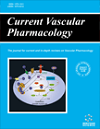-
s Carotid Baroreceptor Stimulation: A Promising Approach for the Management of Resistant Hypertension and Heart Failure
- Source: Current Vascular Pharmacology, Volume 12, Issue 1, Jan 2014, p. 30 - 37
-
- 01 Jan 2014
Abstract
Many difficult-to-treat clinical entities in the cardiovascular field are characterized by pronounced sympathetic overactivity, including resistant hypertension and heart failure, underlining the need to explore therapeutic options beyond pharmacotherapy. Autonomic modulation via carotid baroreceptor activation has already been evaluated in clinical trials for resistant hypertension, and relevant outcomes with regard to safety and efficacy of the technique are critically presented. The pathophysiological background of heart failure renders carotid baroreceptor stimulation a potential treatment candidate for the disease. Available data from animal models with heart failure point towards significant cardioprotective benefits of this innovative technique. Accordingly, the effects of baroreceptor activation treatment (BAT) on cardiac parameters of hypertensive patients are well-promising, setting the basis for upcoming clinical trials with baroreflex activation on patients with heart failure. However, as the potential therapeutic of BAT unfolds and new perspectives are highlighted, several concerns are raised that should be meticulously addressed before the wide application of this invasive procedure is set in the limelight.


